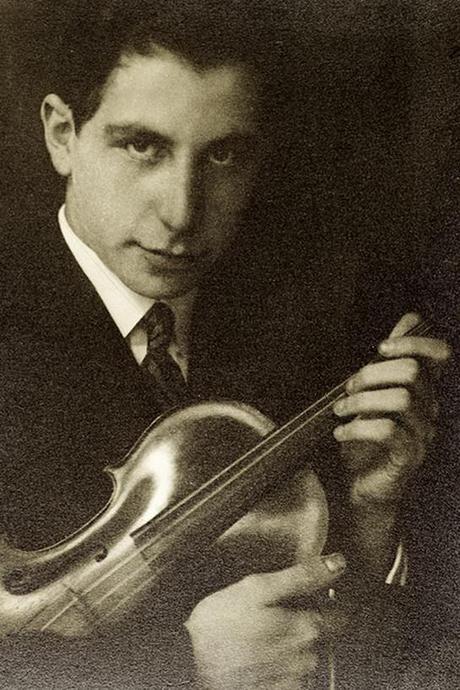
Ernest Bloch
VIOLIN CONCERTO
Roman Totenberg, Violin
Wiener Staatsopernorchester
Dir: Vladimir Golschmann
(VANGUARD).
*
El día 8 de mayo de 2012 falleció a la prodigiosa edad de 101 años el violinista de orígen polaco Roman Totenberg. Sin haber gozado de la fama ni las candilejas que sí disfrutaron un Oistrakh, un Heifetz, un Francescatti ó un Stern, fue un artista de primera categoría, comprometido con su arte. Deseamos dejar una muestra discográfica de su repertorio, en homenaje a su desaparición física… IN MEMORIAM.
*
The Telegraph (08-05-2012)
*
“He gave important premieres of works by Hindemith, Copland and Milhaud, while in Britain he was a popular soloist in the 1950s, displaying dynamic energy at the Wigmore Hall and virtuosity at the Festival Hall.
*
Roman Totenberg was born in Lódz on New Year’s Day 1911 (“Easy to remember, 1-1-11”), the son of an architect. He moved with his parents and elder sister to Warsaw and then Moscow where, one day, his dinner consisted of the head of a horse that had died of starvation. A neighbour was concertmaster at the Bolshoi and gave young Roman his first violin lessons. During the Russian Revolution, “Comrade Totenberg” was soon giving recitals to communist chiefs in exchange for crumbs of food (“White bread!”).
*
Returning to Warsaw in 1921, Totenberg studied with Mieczyslaw Michalowicz and was soon appearing with the Warsaw Philharmonic. He met Karol Szymanowski, visited the pianist Rudolf Firkusny in Prague and moved to Berlin. By the age of 11 he was teaching his first pupil.
*
Many years later he recalled Menuhin’s Berlin debut (of which Einstein famously remarked: “Now I know there is a God in Heaven”). “Terribly impressive, really a kind of playing that came from nowhere,” was Totenberg’s verdict. Twice a week he had lessons with Carl Flesch, and in 1932 he won the Mendelssohn Prize. On a visit to Warsaw he spent a month teaching the young Ida Haendel.
*
After a cousin was beaten by the SS in Berlin, Totenberg moved to Paris, where he worked under George Enesco. At his official debut there in 1935 he gave the premiere of Hindemith’s Sonata. Milhaud was in the audience and would eventually write a concerto for him.
*
Later that year Totenberg was heard in London and America . In Washington he gave the National Symphony Orchestra’s premiere of Beethoven’s Violin Concerto, while at the White House Eleanor Roosevelt served him dinner sitting on the floor and Vice-President Garner didn’t wear shoes.
*
He toured South America with Arthur Rubinstein in 1937, turned pages for Fritz Kreisler in Paris, and was ordered to walk backwards offstage after performing for King Victor Emmanuel III of Italy.
Soon Paris also felt unsafe and, in 1938, Totenberg settled in New York, forming the Alma Trio with the pianist Adolph Baller and the cellist Gabor Rejto. He also played for Broadway shows and gave numerous recitals, including the premiere of a Sonata that Copland had written for him.
*
His London concert in November 1952, with the clarinettist Gervase de Peyer and the pianist Theo van der Pas, was billed as the “reappearance of the celebrated violinist”. And in 1957 his Brahms and Beethoven programme with Claude Frank “really caused the listener to sit up and listen to each work as if with new ears”. After his last British recital, at the Queen Elizabeth Hall in 1971, he was affectionately described as an “Old Master”.
*
Totenberg joined Boston University, Massachusetts, in 1961. “You learn a lot more than the students do,” he quipped. He returned to Moscow in 1998 as a juror in the Tchaikovsky Violin Competition, visiting the house by the Kremlin where his mother had once fed him horse meat.
*
Modest to a fault, Totenberg refused to say that his playing had improved over the years. “You simply play differently at different times of your life,” he said on his 95th birthday. And still he carried on teaching; hours before he died he was coaching a student in the Brahms Violin Concerto. “Slow down,” he told her.
Roman Totenberg married, in 1941, Melanie Shroder, who died in 1996. He is survived by their three daughters, with whom he enjoyed at least one seaside holiday with the Stravinskys.”
______________________
Album (Concierto para violín: Trois poemes juifs)

